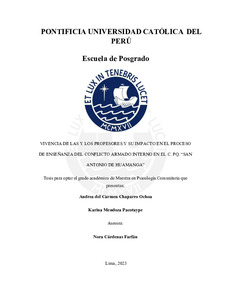| dc.contributor.advisor | Cárdenas Farfán, Nora | |
| dc.contributor.author | Chaparro Ochoa, Andrea del Carmen | |
| dc.contributor.author | Mendoza Pacotaype, Karina | |
| dc.date.accessioned | 2024-01-31T20:33:11Z | |
| dc.date.available | 2024-01-31T20:33:11Z | |
| dc.date.created | 2023 | |
| dc.date.issued | 2024-01-31 | |
| dc.identifier.uri | http://hdl.handle.net/20.500.12404/27010 | |
| dc.description.abstract | La actual investigación analizará las vivencias de las y los profesores y el
impacto durante su formación del CAI, en el C. Pq. “San Antonio de Huamanga”, del
nivel primaria y secundaria, en el distrito de Ayacucho, departamento Ayacucho. El
estudio es cualitativo y se ajusta dentro de la pedagogía de la liberación. Para recoger
la información hemos realizado entrevistas semi-estructuradas, observación
etnográfica y diario de campo. Se ha considerado los aspectos éticos relacionados con
la investigación, como consentimiento informado hacia los profesores y la I.E,
partiendo de la familiarización, cuidado y respeto con las vivencias de las y los
profesores. Finalmente, a modo de conclusiones sostenemos que, las y los profesores
cuentan con vivencias directas y/o indirectas sobre el CAI, los cuales tienen
repercusiones en sus vidas diarias y en los procesos de enseñanza que no han sido
considerados por el Ministerio de Educación. La IE y la comunidad educativa son
factores que posibilitan el abordaje del CAI pues generan espacios para trabajarlo,
demostrando disposición, compromiso e interés con el fin de formar ciudadanos
democráticos, con sentido de la diversidad, conciencia histórica y pensamiento crítico.
Sin embargo, existen factores que dificultan el tratamiento del CAI como prácticas
autoritarias y poco reflexiva, evaluaciones estandarizadas del MINEDU, poco diálogo
y un CN que no favorece ni valora ni recupera los conocimientos previos de los alumnos
lo que imposibilita alcanzar un nivel más complejo en sus aprendizajes y donde se
promueva el desarrollo de un sentido crítico de la realidad de nuestro país. | es_ES |
| dc.description.abstract | The current investigation will analyze the teacher’s experiences and their impact
during the CAI formation, in the C. Pq. "San Antonio de Huamanga", at primary and
secondary level, in the district of Ayacucho, department of Ayacucho. The study is
qualitative and is adjusted within the pedagogy of liberation. To collect the information we
conducted semi-structured interviews, ethnographic observation and field diary. We have
considered the ethical aspects related to the research, such as informed consent towards the
teachers and the school, based on familiarization, care and respect for the experiences of
the teachers. Finally, by way of conclusions, we maintain that teachers have direct and/or
indirect experiences about the CAI, which have repercussions in their daily lives and in the
teaching processes that have not been considered by the Ministry of Education. The IE and
the educational community are factors that make it possible to address the CAI because
they generate spaces to work on it, showing willingness, commitment and interest in order
to form democratic citizens, with a sense of diversity, historical awareness and critical
thinking. However, there are factors that hinder the treatment of CAI such as authoritarian
and not very reflective practices, standardized evaluations of MINEDU, little dialogue and
a NC that does not favor or value or recover the students' previous knowledge, which makes
it impossible to reach a more complex level in their learning and where the development
of a critical sense of the reality of our country is promoted. | es_ES |
| dc.language.iso | spa | es_ES |
| dc.publisher | Pontificia Universidad Católica del Perú | es_ES |
| dc.rights | info:eu-repo/semantics/openAccess | es_ES |
| dc.rights.uri | http://creativecommons.org/licenses/by-nc-sa/2.5/pe/ | * |
| dc.subject | Conflicto armado--Perú--Ayacucho | es_ES |
| dc.subject | Violencia política--Perú--Ayacucho | es_ES |
| dc.subject | Ciudadanía--Educación | es_ES |
| dc.title | Vivencia de las y los profesores y su impacto en el proceso de enseñanza del conflicto armado interno en el C. PQ. "San Antonio de Huamanga" | es_ES |
| dc.type | info:eu-repo/semantics/masterThesis | es_ES |
| thesis.degree.name | Maestro en Psicología Comunitaria | es_ES |
| thesis.degree.level | Maestría | es_ES |
| thesis.degree.grantor | Pontificia Universidad Católica del Perú. Escuela de Posgrado | es_ES |
| thesis.degree.discipline | Psicología Comunitaria | es_ES |
| renati.advisor.dni | 23855292 | |
| renati.advisor.orcid | https://orcid.org/0000-0001-8833-554X | es_ES |
| renati.author.dni | 70090874 | |
| renati.author.dni | 47817833 | |
| renati.discipline | 313287 | es_ES |
| renati.juror | Rivera Holguin, Miryam Rebeca | es_ES |
| renati.juror | Cardenas Farfan, Nora | es_ES |
| renati.juror | Salas Franco, Mariana Patricia | es_ES |
| renati.level | https://purl.org/pe-repo/renati/level#maestro | es_ES |
| renati.type | https://purl.org/pe-repo/renati/type#tesis | es_ES |
| dc.publisher.country | PE | es_ES |
| dc.subject.ocde | https://purl.org/pe-repo/ocde/ford#5.01.00 | es_ES |







